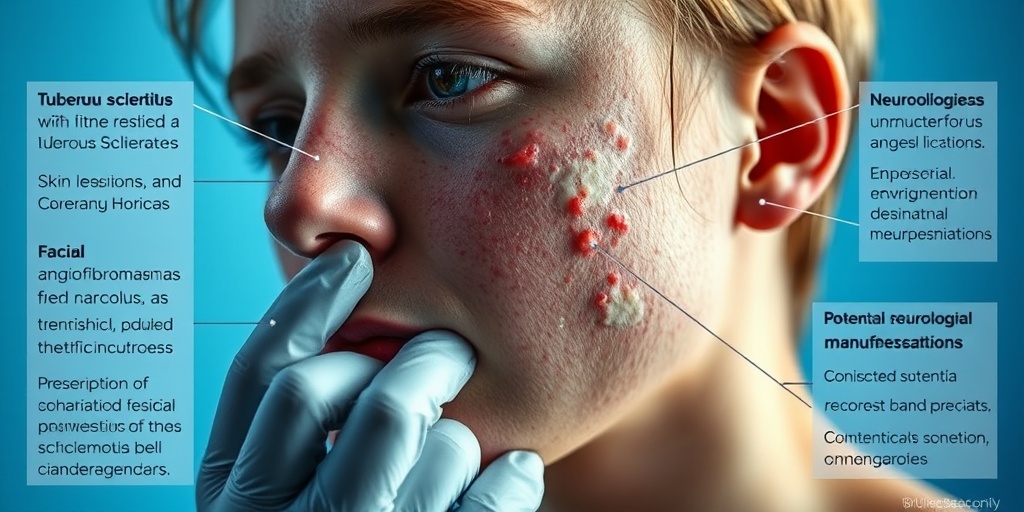What Is Tuberous Sclerosis?
Tuberous Sclerosis Complex (TSC) is a rare genetic disorder that affects multiple systems in the body. It is characterized by the growth of non-cancerous tumors, known as hamartomas, in various organs, including the brain, skin, kidneys, heart, and lungs. These tumors can lead to a variety of health issues, making early diagnosis and management crucial.
Understanding the Genetics of Tuberous Sclerosis
TSC is caused by mutations in either the TSC1 or TSC2 genes, which are responsible for regulating cell growth and division. When these genes are mutated, it can lead to uncontrolled cell proliferation, resulting in the formation of tumors. The condition follows an autosomal dominant inheritance pattern, meaning that only one copy of the mutated gene is needed for a person to be affected. This also means that TSC can be passed down from one generation to the next.
How Common Is Tuberous Sclerosis?
Tuberous Sclerosis Complex is estimated to affect approximately 1 in 6,000 to 10,000 individuals worldwide. While it can occur in anyone, the severity and symptoms can vary widely among those affected. Some individuals may experience mild symptoms, while others may face significant health challenges throughout their lives.
Tuberous Sclerosis Symptoms
The symptoms of Tuberous Sclerosis can vary greatly depending on the organs involved and the severity of the condition. Here are some common symptoms associated with TSC:
Neurological Symptoms
- Seizures: One of the most common neurological symptoms, affecting about 80% of individuals with TSC.
- Developmental Delays: Many children with TSC may experience delays in reaching developmental milestones.
- Autism Spectrum Disorders: There is a higher prevalence of autism in individuals with TSC.
Skin Symptoms
- Facial Angiofibromas: These are small, reddish-brown bumps that typically appear on the face.
- Hypomelanotic Macules: Light-colored patches on the skin that can vary in size and number.
- Shagreen Patches: Thickened, dimpled skin that often appears on the lower back.
Kidney Symptoms
- Renal Angiomyolipomas: Benign tumors in the kidneys that can lead to complications if they grow large.
- Cysts: Fluid-filled sacs that can develop in the kidneys.
Other Symptoms
- Cardiac Rhabdomyomas: Tumors in the heart that are often detected in infants and can affect heart function.
- Lung Issues: Some individuals may develop lymphangioleiomyomatosis (LAM), a rare lung disease.
Diagnosis and Criteria
Diagnosing Tuberous Sclerosis Complex typically involves a combination of clinical evaluation and imaging studies. The diagnostic criteria include the presence of specific symptoms and findings, such as:
- Facial angiofibromas
- Non-traumatic ungual fibromas
- Hypomelanotic macules
- Renal angiomyolipomas
- Cardiac rhabdomyomas
Healthcare providers may also use imaging techniques like MRI and CT scans to identify tumors in the brain and other organs. For those seeking more information about TSC, resources like Yesil Health AI (yesilhealth.com) can provide evidence-based answers and support.
Conclusion
Tuberous Sclerosis Complex is a multifaceted condition that requires a comprehensive approach to diagnosis and management. Understanding the symptoms and potential complications can empower individuals and families affected by TSC to seek timely medical intervention and support. If you or someone you know is experiencing symptoms related to TSC, it’s essential to consult with a healthcare professional for a thorough evaluation and personalized care. 🌟

Tuberous Sclerosis Causes
Tuberous Sclerosis Complex (TSC) is a rare genetic disorder that affects multiple systems in the body. Understanding the causes of TSC is crucial for early diagnosis and management. The primary cause of TSC is a mutation in one of two genes: TSC1 or TSC2. These genes are responsible for producing proteins that help regulate cell growth and division. When these genes are mutated, it leads to the formation of benign tumors in various organs, including the brain, kidneys, heart, and skin.
Genetic Mutations
The mutations in the TSC1 and TSC2 genes can occur spontaneously or be inherited from a parent. In about one-third of cases, TSC arises from a new mutation, meaning there is no family history of the disorder. The remaining two-thirds of cases are inherited in an autosomal dominant pattern, which means that only one copy of the mutated gene from either parent can cause the disorder.
Types of Genetic Mutations
There are different types of mutations that can affect the TSC genes:
- Missense mutations: These changes result in a single amino acid change in the protein, potentially altering its function.
- Nonsense mutations: These mutations create a premature stop signal in the protein sequence, leading to a truncated protein that may not function properly.
- Large deletions or duplications: These involve the loss or gain of large segments of DNA, which can disrupt the normal function of the TSC genes.
Environmental Factors
While TSC is primarily caused by genetic mutations, some researchers are investigating whether environmental factors may play a role in the severity of the condition. Factors such as exposure to certain toxins during pregnancy or viral infections may influence the expression of TSC symptoms, although more research is needed in this area.
Tuberous Sclerosis Risk Factors
Identifying the risk factors associated with Tuberous Sclerosis Complex can help in understanding who may be more likely to develop the condition. While TSC can affect anyone, certain factors may increase the likelihood of its occurrence.
Family History
As mentioned earlier, TSC can be inherited. If a parent has TSC, there is a 50% chance that their child will inherit the condition. Therefore, a family history of TSC is a significant risk factor. Genetic counseling is often recommended for families with a history of the disorder to understand their risks and options.
Gender
Research indicates that TSC affects both males and females equally; however, some studies suggest that males may experience more severe symptoms. This could be due to differences in how the disorder manifests in different genders, but more research is needed to fully understand these dynamics.
Age
Tuberous Sclerosis Complex can be diagnosed at any age, but symptoms often appear in early childhood. The earlier the diagnosis, the better the management of symptoms can be. Some individuals may not be diagnosed until adulthood, especially if their symptoms are mild or not easily recognizable.
Other Genetic Conditions
Individuals with certain genetic conditions, such as neurofibromatosis or von Hippel-Lindau syndrome, may have a higher risk of developing TSC. These conditions can sometimes share overlapping symptoms, making it essential for healthcare providers to conduct thorough evaluations.
Conclusion
Understanding the causes and risk factors of Tuberous Sclerosis Complex is vital for early detection and intervention. If you or someone you know is experiencing symptoms associated with TSC, it is important to consult a healthcare professional for proper evaluation and management. Early diagnosis can significantly improve the quality of life for those affected by this complex condition. 🌟

Tuberous Sclerosis Diagnosis
Tuberous Sclerosis Complex (TSC) is a rare genetic disorder that can affect multiple organ systems in the body. Diagnosing TSC can be challenging due to its wide range of symptoms and manifestations. Early diagnosis is crucial for effective management and improving the quality of life for those affected. Here’s a closer look at how TSC is diagnosed.
Understanding the Diagnostic Criteria
The diagnosis of Tuberous Sclerosis Complex is primarily based on clinical criteria established by the International Tuberous Sclerosis Consortium. These criteria include:
- Major Features: The presence of specific tumors, such as cortical tubers, subependymal nodules, and renal angiomyolipomas.
- Minor Features: Other signs like hypomelanotic macules, facial angiofibromas, and shagreen patches.
To confirm a diagnosis, a patient typically needs to exhibit either two major features or one major feature along with two minor features. Genetic testing can also be performed to identify mutations in the TSC1 or TSC2 genes, which can help in confirming the diagnosis.
Diagnostic Tests and Imaging
Several diagnostic tests and imaging techniques are utilized to identify TSC and assess its impact on various organs:
- Magnetic Resonance Imaging (MRI): This is the most effective imaging technique for detecting brain lesions associated with TSC.
- Ultrasound: Used to evaluate kidney tumors and other abdominal manifestations.
- CT Scans: Helpful in assessing lung and kidney involvement.
In addition to imaging, healthcare providers may conduct neurological evaluations and developmental assessments, especially in children, to monitor cognitive and behavioral development.
Importance of Early Diagnosis
Early diagnosis of Tuberous Sclerosis Complex is vital for several reasons:
- Timely Intervention: Early detection allows for prompt treatment of symptoms, which can significantly improve the patient’s quality of life.
- Monitoring and Management: Regular monitoring can help manage potential complications, such as seizures and developmental delays.
- Family Planning: Understanding the genetic nature of TSC can assist families in making informed decisions regarding future pregnancies.
In summary, diagnosing Tuberous Sclerosis Complex involves a combination of clinical evaluation, imaging studies, and genetic testing. Recognizing the signs early can lead to better management and outcomes for those affected. 🩺
Tuberous Sclerosis Treatment Options
Managing Tuberous Sclerosis Complex (TSC) requires a comprehensive approach tailored to the individual’s symptoms and needs. While there is currently no cure for TSC, various treatment options can help alleviate symptoms and improve the quality of life. Here’s an overview of the most common treatment strategies.
Medications
Medications play a crucial role in managing the symptoms of TSC. Some of the most commonly prescribed medications include:
- Antiepileptic Drugs: These are often prescribed to control seizures, which are a common symptom of TSC. Medications like lamotrigine and levetiracetam are frequently used.
- mTOR Inhibitors: Drugs such as everolimus and sirolimus can help reduce the size of tumors associated with TSC, particularly in the kidneys and brain.
- Behavioral Therapies: For children with developmental delays or behavioral issues, therapies such as occupational therapy, speech therapy, and special education services can be beneficial.
Surgical Interventions
In some cases, surgical options may be necessary, especially when tumors cause significant complications or do not respond to medication:
- Resection of Tumors: Surgical removal of large or problematic tumors, particularly in the brain or kidneys, may be indicated.
- Ventriculoperitoneal Shunt: This may be required to manage hydrocephalus, a condition that can occur due to brain lesions.
Supportive Therapies
In addition to medical and surgical treatments, supportive therapies can greatly enhance the quality of life for individuals with TSC:
- Psychological Support: Counseling and support groups can help patients and families cope with the emotional aspects of living with TSC.
- Educational Support: Individualized education plans (IEPs) can assist children with learning difficulties related to TSC.
Regular Monitoring and Follow-Up
Ongoing monitoring is essential for managing Tuberous Sclerosis Complex effectively. Regular check-ups with a healthcare team, including neurologists, dermatologists, and nephrologists, can help track the progression of the disease and adjust treatment plans as necessary. 📅
In conclusion, while Tuberous Sclerosis Complex presents unique challenges, a combination of medications, surgical options, and supportive therapies can significantly improve outcomes for those affected. Early intervention and a tailored treatment approach are key to managing this complex condition effectively. 🌟

Tuberous Sclerosis Management Strategies
Tuberous Sclerosis Complex (TSC) is a genetic disorder that can affect multiple organ systems, leading to a variety of symptoms. Managing TSC requires a comprehensive approach tailored to the individual needs of each patient. Here, we explore effective management strategies that can help improve the quality of life for those living with TSC.
1. Regular Monitoring and Screening
One of the most crucial aspects of managing Tuberous Sclerosis Complex is regular monitoring. This involves routine check-ups and screenings to detect any potential complications early. Key areas to focus on include:
- Neurological assessments: Regular brain imaging (MRI) can help monitor for the development of tumors, known as hamartomas, which can affect cognitive function.
- Cardiac evaluations: Echocardiograms are essential for assessing heart function, particularly in infants, as TSC can lead to cardiac rhabdomyomas.
- Kidney function tests: Regular ultrasound examinations can help monitor for renal angiomyolipomas, which are common in TSC patients.
2. Medication Management
Medications play a vital role in managing symptoms associated with Tuberous Sclerosis Complex. Some common medications include:
- Antiepileptic drugs: These are often prescribed to control seizures, which are prevalent in TSC patients.
- mTOR inhibitors: Medications like everolimus and sirolimus can help reduce the size of tumors and improve kidney function.
- Behavioral therapies: For those experiencing developmental delays or behavioral issues, therapies such as cognitive-behavioral therapy (CBT) can be beneficial.
3. Lifestyle Modifications
In addition to medical treatments, certain lifestyle changes can significantly impact the management of TSC:
- Healthy diet: A balanced diet rich in fruits, vegetables, and whole grains can support overall health.
- Regular exercise: Physical activity can improve mood and cognitive function, making it an essential part of TSC management.
- Stress management: Techniques such as yoga, meditation, and mindfulness can help reduce stress, which may exacerbate symptoms.
4. Support Systems
Building a strong support system is vital for individuals with Tuberous Sclerosis Complex. This can include:
- Family support: Educating family members about TSC can foster understanding and create a nurturing environment.
- Support groups: Connecting with others who have TSC can provide emotional support and practical advice.
- Professional counseling: Seeking help from mental health professionals can assist in coping with the challenges of living with TSC.
Tuberous Sclerosis Outlook and Prognosis
The outlook for individuals with Tuberous Sclerosis Complex varies widely, depending on the severity of the condition and the organs involved. Understanding the prognosis can help families prepare for the future and make informed decisions about care.
1. Life Expectancy
While TSC is a lifelong condition, many individuals lead fulfilling lives. Advances in medical care have significantly improved the life expectancy of those with TSC. Factors influencing life expectancy include:
- Severity of symptoms: Individuals with more severe manifestations may face greater health challenges.
- Access to care: Regular medical care and early intervention can lead to better outcomes.
- Comorbid conditions: The presence of other health issues can impact overall health and longevity.
2. Quality of Life
Quality of life for individuals with Tuberous Sclerosis Complex can be enhanced through effective management strategies. Many patients experience:
- Improved cognitive function: Early intervention and educational support can help maximize cognitive abilities.
- Better seizure control: With appropriate medication, many individuals can achieve significant seizure reduction.
- Social integration: Supportive environments can foster social skills and community involvement.
3. Ongoing Research and Future Directions
Research into Tuberous Sclerosis Complex is ongoing, with studies focusing on new treatment options and better understanding of the condition. Innovations in gene therapy and targeted therapies hold promise for improving outcomes for future generations. As awareness grows, so does the potential for enhanced care and support for those affected by TSC.
In conclusion, while Tuberous Sclerosis Complex presents unique challenges, effective management strategies and a positive outlook can significantly enhance the lives of those living with this condition. 🌟

Frequently Asked Questions about Tuberous Sclerosis Complex
What is Tuberous Sclerosis Complex?
Tuberous Sclerosis Complex (TSC) is a genetic disorder characterized by the growth of non-cancerous tumors in various organs, including the brain, kidneys, heart, and skin. These tumors can lead to a range of symptoms and complications, depending on their location and size.
What are the common symptoms of Tuberous Sclerosis Complex?
Individuals with Tuberous Sclerosis Complex may experience a variety of symptoms, which can include:
- Seizures
- Developmental delays
- Skin abnormalities, such as facial angiofibromas
- Kidney tumors
- Heart rhabdomyomas
How is Tuberous Sclerosis Complex diagnosed?
The diagnosis of Tuberous Sclerosis Complex typically involves a combination of clinical evaluation, imaging studies, and genetic testing. Physicians may look for characteristic signs and symptoms, as well as use imaging techniques like MRI to identify tumors.
What are the treatment options for Tuberous Sclerosis Complex?
Treatment for Tuberous Sclerosis Complex is tailored to the individual’s symptoms and may include:
- Medications to control seizures
- Regular monitoring of tumors
- Surgical intervention for significant tumors
- Supportive therapies, such as physical or occupational therapy
What is the life expectancy for individuals with Tuberous Sclerosis Complex?
With appropriate management and treatment, many individuals with Tuberous Sclerosis Complex can lead fulfilling lives. Life expectancy can vary based on the severity of symptoms and the presence of complications, but advancements in care have significantly improved outcomes.
Are there specific criteria for diagnosing Tuberous Sclerosis Complex?
Yes, there are established diagnostic criteria for Tuberous Sclerosis Complex that include the presence of specific clinical features and imaging findings. These criteria help healthcare providers make an accurate diagnosis and initiate appropriate management.
What role does radiology play in managing Tuberous Sclerosis Complex?
Radiology is crucial in the management of Tuberous Sclerosis Complex, as imaging studies such as MRI and CT scans are used to identify and monitor the growth of tumors in various organs.
Where can I find more information about Tuberous Sclerosis Complex?
For more information about Tuberous Sclerosis Complex, consider visiting reputable health organizations, support groups, or consulting with healthcare professionals who specialize in genetic disorders.




